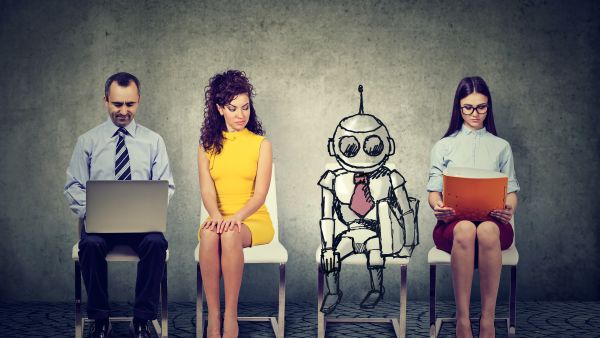While the world celebrates technological advancements, including robotic and AI, there's also the fear that many human professions will inevitably be lost to the very creatures we're creating.
As technology is rapidly changing lifestyles and transforming all aspects of life, many analysts are predicting a second industrial revolution. Ever-evolving technology is raising the bar for skill and efficiency across multiple industries.
Smart computers and robots are able to perform human tasks with almost no errors, but they can also be programmed to work for an endless number of hours without breaks, weekends, or sick days. Most business owners will consider having robot workers over human ones because they can maximize quality and production rates and consequently their profit, while saving on costs like salaries, social security, and medical insurance.
Experts believe a third of the global workforce will be automated by 2030 — that's 800 million careers from doctors to accountants, lawyers to journalists.
— VICE UK (@VICEUK) September 13, 2018
Here's what universities are doing to future-proof their students against a robot takeover https://t.co/z8l0JaJzTO pic.twitter.com/EvWeyZqbui
Automation has already infiltrated manual labor industries like construction and logistics, but it's also taking over analytical jobs that help process and interpret complicated data in very little time. These abilities mean that computers and robots could be coming after many jobs that people have long believed were exclusive to humans.
For decades, people have underrated the danger technology imposes on different professions arguing that no matter how far it advances, some jobs are going to be safe. But as AI is increasingly able to self teach, there is a fear that the singularity is near.
There's still a big debate over whether technology will ever replace humans in jobs that entail emotions and empathy, like teachers, nurses, and babysitters, but no one can guarantee that AI will not figure out ways to demonstrate these very humane characteristics.
Technology has already taken over many jobs that humans used to perform, like typists, telephone operators, photo processors, and elevator operators.
But today, a number of other professional fields face the same looming danger of dying in the face of superior technology.
Sexy robot influencers are taking over Instagram — and coming for your jobs https://t.co/fJkvXJZEJJ pic.twitter.com/BW2aIkanzN
— New York Post (@nypost) January 14, 2020
Drivers
The motor industry is going through revolutionary developments that will make self-driving cars the new standard. And with little manual interference, cars, buses, and trains are being programmed to take the shortest and clearest routes and to follow road rules that effectively limit car accidents that even humans have not been able to avoid.
Audi has been at the @CES in Las Vegas since 2011. This year we announced AI:Me – a self driving car with eye tracking technology. The concept for the future urban traveler: https://t.co/HdD36ydzQ8 pic.twitter.com/duOEzB5Ewa
— Audi Canada (@AudiCanada) January 14, 2020
Cars being able to operate with no human intervention means that not only public transport drivers could lose their jobs, but also that delivery services will also be automated, putting millions of people out of work worldwide.
Ford wants to replace your UPS driver with a robot
— FASTPACK (@FASTPACK) January 15, 2020
Interesting! https://t.co/bAgBTDeYas
Primary Care Physicians
AI will have the potential to diagnose patients' symptoms and record their data and medical history, in addition to their health concerns just as efficiently as general practitioners do these days. Robots can also write prescriptions to treat common medical conditions and advise a patient with more complicated or alarming symptoms to visit a human doctor.
An AI doctor is analysing heart scans in dozens of hospitals https://t.co/K0WZpkTE2k pic.twitter.com/OYt6a3aeKP
— New Scientist (@newscientist) November 22, 2019
Even though getting people to trust robots when it comes to their health can be challenging, electronic physicians will be inevitable.
While this can certainly put doctors out of the job, there's a silver lining. Medical AI can eventually help doctors and nurses in emergency rooms to treat a greater number of patients who do not need intensive medical care.
Additionally, this can allow more doctors to devote more time to pursue medical research and conduct more experiments to help humanity get over some chronic diseases that are still incurable.
Human Resources & Recruiters
Businesses already started using digital applications to help speed up their recruitment processes by having programs read and analyze applicants' resumes and narrowing the number of skilled prospective candidates.
Now, human resources departments have also started using AI software to interview candidates, analyze their answers and read their facial expressions to generate recommendations that help decision-makers hire the right people.
HireVue "technology" - we are living in the dystopian future where you can be screened out of a job because of your appearance on a given day and not because of your knowledge or ability. What has happened to the world where we used to talk to each other?https://t.co/1Dym5JyLxy
— Steven E Montez (@Steve_Montez) January 10, 2020
Some people argue that such technologies can play a vital role in limiting biases that hiring committees might have, yet using these applications can mean that people who have difficulty communicating with non-human objects can suffer a higher chance of unemployment regardless of their skills.
Cashiers and Salespeople
When it comes to automated shopping experiences, we don't have to think so far in the future, because similar applications have been in use for years already, especially in developed countries. Not to confuse automated shopping experiences with online shopping, many stores including grocery stores no longer need to have cashiers to scan products and hand change back to customers.
Similarly, more and more stores are now using machines to answer customer questions about product specifications and to generate recommendations based on buyers' preferences, including clothes and jewelry shops.
https://t.co/JolSngALm1
— Orin Rosenfeld (@RosenfeldRA) January 13, 2020
Like any retail business, grocery stores need 2 keep coming up w new ways to get people in the door. How about being able to register or renew your auto registration there thru an automated kiosk? Happening now @ Publix in Tampa & soon will expand rapidly.
Are automated shopping carts the solution for the generation’s distaste for waiting in line to pay at the supermarket? ... I don't know but what I saw in this video was pretty impressive! ?#AI #ArtificialIntelligence #DataScience #3DModeling pic.twitter.com/POQPHiK2w3
— Segundo Ramos (@segundoatdell) December 13, 2019
Journalists
The Rise of the Robot Reporter: @nytimes provides a solid overview of how AI is being used across the news industry to support, supplement and at times replace journalistshttps://t.co/dCW0C80OZd
— Ross Dawson (@rossdawson) February 5, 2019
Newspapers are already trying to survive this internet-struck universe and they have long been losing to online platforms. Many who were working for the traditional press have, so far, been able to make a few adjustments to accommodate the requirements of the new form of journalism.
However, with more AI software producing meaningful writings and proofreading them and translating them to different languages with very few errors, journalists and reporters may have to watch their jobs get taken over by algorithm-operating software in the very near future.
Musicians
This robot can listen to human musicians and improvise along with them pic.twitter.com/j5Z1DPBred
— NowThis (@nowthisnews) November 16, 2018
For decades, people have assumed that jobs that require a high level of creativity and artistic skills are least likely to be affected by the tech invasion, but they will soon be proven wrong. IT developers have successfully delivered robot musicians and music bands that can play music pieces on all sorts of musical instruments. Even more fascinating, some music software has become smart enough to improvise their own music and compose an endless number of songs.
Welcome to the future! Presented by Tsinghua University, a robot band featuring Chinese musical instruments has stunned Chinese netizens. Have a look at these robotic musicians. pic.twitter.com/93WmE9htuR
— People's Daily, China (@PDChina) December 30, 2019






![Turkish series "Ask-ı Memnu" [Forbidden Love]. Turkish series "Ask-ı Memnu" [Forbidden Love].](/sites/default/files/styles/d02_traditional/public/2026-02/%D8%A3%D8%A8%D8%B7%D8%A7%D9%84-%D9%85%D8%B3%D9%84%D8%B3%D9%84-%D8%A7%D9%84%D8%B9%D8%B4%D9%82-%D8%A7%D9%84%D9%85%D9%85%D9%86%D9%88%D8%B9.jpg?h=c673cd1c&itok=nhq8-5rH)
